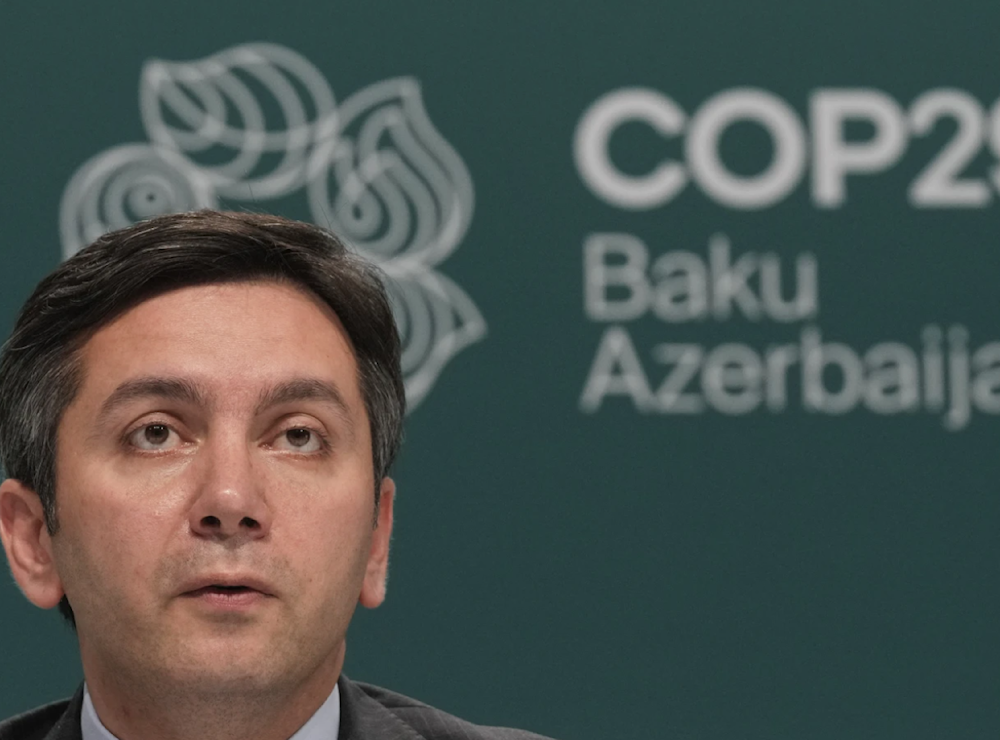World approves UN rules for carbon trading between nations at COP29
Article 6 will allow affluent polluters to purchase carbon credits from other nations performing better on emission reductions and includes country-to-country commerce and a separate UN-backed marketplace.
-

Yalchin Rafiyev, Azerbaijan's COP29 lead negotiator, speaks during a news conference at the COP29 UN Climate Summit on November 15, 2024. (AP)
New regulations enabling affluent polluting countries to buy carbon-cutting "offsets" from developing nations were agreed upon at UN climate negotiations on Saturday, prompting concerns that they may be used to greenwash climate ambitions.
This decision made at the COP29 summit is a significant step forward in a contentious topic that has plagued climate talks for years.
Supporters believe a UN-backed carbon pricing mechanism could direct investment to poorer countries, where many carbon credits are generated and critics caution that poor implementation could hinder global efforts to combat climate change.
Carbon credits are created by activities that decrease or eliminate global warming greenhouse gas emissions, such as tree planting, safeguarding existing carbon sinks, or replacing polluting coal with renewable energy alternatives.
Until now, these credits have mostly been sold by corporations in an uncontrolled market riddled with controversy. However, the 2015 Paris climate agreement anticipated nations participating in cross-border trade of carbon reductions.
Article 6 will allow affluent polluters to purchase carbon credits from other nations performing better on emission reductions and includes country-to-country commerce and a separate UN-backed marketplace. It has become popular among both poor countries seeking foreign assistance and wealthy governments searching for new solutions to satisfy stringent carbon reduction commitments.
The European Union and the United States pushed for an agreement at COP29 in Baku, Azerbaijan's capital, while many poor countries, notably in Asia and Africa, have already signed on to initiatives.
Analysts are concerned the systems would allow governments to sell bogus carbon reductions, masking their inability to decrease greenhouse gas emissions. According to the US, more than 90 agreements between states for over 140 pilot projects had already been reached earlier this month.
Global South rejects $250Bln climate deal at COP29
AFP reported on Friday that negotiations at COP29 in Baku stalled after developing nations rejected a $250 billion climate funding offer from wealthy countries, calling it inadequate.
The proposal aimed to increase annual climate aid from $100 billion to $250 billion by 2035, far below the $500 billion demanded by vulnerable nations to combat climate change and its impacts.
Representatives from small island states and African countries criticized the offer as "shameful" and "unacceptable," warning of catastrophic consequences.
"It is shameful to put forward texts like these," said Tina Stege, climate envoy for the Marshall Islands, whose very existence is under threat from rising sea levels.
Meanwhile, the US signaled no intention to negotiate further. According to AFP, senior officials from the Biden administration reportedly called the $250 billion offer an example of "extraordinary reach."
Analysts argue that with the shadow of President-elect Donald Trump looming large, expectations are mounting that the US will retreat from climate diplomacy altogether.

 3 Min Read
3 Min Read








